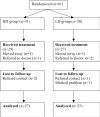The dose-response effect of medical exercise therapy on impairment in patients with unilateral longstanding subacromial pain
- PMID: 20148093
- PMCID: PMC2817873
- DOI: 10.2174/1874325001004010001
The dose-response effect of medical exercise therapy on impairment in patients with unilateral longstanding subacromial pain
Abstract
Objectives: The primary aim of this study was to investigate the effect of medical exercise therapy in shoulder impingement patients, along with possible correlations between impairment variables.
Study design: A prospective unblended randomized clinical trial.
Methods: Over four months, 61 participants were randomly assigned into a high-graded exercise therapy group (HD) (n=31) and into a low-graded exercise therapy group (LD) (n=30). Prognostic variables were similar between the groups at baseline. Five (8%) patients dropped out during the treatment period, and another four (6%) dropped out before followup. Pain was a composite score of a visual analogue scale (VAS). Isometric strength was measured during four resisted break tests on the shoulder. Function was measured by means of a functional assessment questionnaire (Shoulder Rating Questionnaire, SRQ). Both groups trained three times per week for twelve weeks, with tests pre- and posttraining and six months follow-up.
Results: The HD group achieved significantly (p < 0.05) better outcome effects than the LD group for pain, range of motion, isometric functional strength and function, but both groups increased function from pretest to posttest.
Conclusions: In patients with uncomplicated subacromial pain syndrome, medical exercise therapy is an efficient treatment alternative, where high-grade doses should be emphasized. A major limitation is that the measurements were not undertaken by another person than the treating physiotherapists.
Keywords: Shoulder; dose-response; impingement; muscle function.; physical therapy; rehabilitation.
References
-
- Jette AM, Delitto A. Physical therapy treatment choices for musculoskeletal impairments. Phys Ther. 1997;77:145–54. - PubMed
-
- Luime JJ, Koes BW, Hendriksen IJ, et al. Prevalence and incidence of shoulder pain in the general population; A systematic review. Scand J Rheumatol. 2004;33(2):73–81. - PubMed
-
- Kuhn JE. Exercise in the treatment of rotator cuff impingement: A systematic review and synthesized evidence-based rehabilitation protocol. J Shoulder Elbow Surg. 2009;18:138–60. - PubMed
-
- Desmeules F, Cote CH, Fremont P. Therapeutic exercise and orthopedic manual therapy for impingement syndrome: a systematic review. Clin J Sport Med. 2003;13:176–82. - PubMed
LinkOut - more resources
Full Text Sources
Medical
Research Materials

